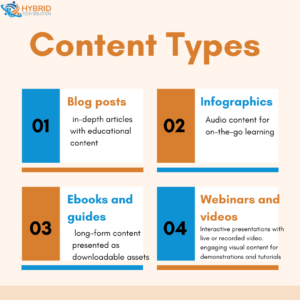An effective content marketing strategy is essential for driving traffic, leads, and sales through valuable, relevant content. But what exactly should you include in your content marketing strategy? In this comprehensive guide, we’ll explore the key elements every content marketing strategy needs.
Overview
A content marketing strategy provides a high-level plan for creating and distributing content to attract and retain customers. It should outline your goals, target audience, content types, distribution channels, and success metrics.
Your strategy acts as a blueprint for your content marketing efforts so you can create consistent, high-quality content that resonates with your audience. Follow this guide to develop a robust strategy tailored to your business.

Goals
Clearly define your goals so you can craft content that helps you achieve them. Potential content marketing goals include:
- Increase website traffic
- Generate more leads
- Nurture leads through the sales funnel
- Build brand awareness and loyalty
- Engage your target audience
- Establish thought leadership
- Convert readers into customers
Identify 2-3 primary goals to focus on so your content stays aligned with desired outcomes.
Audience Personas
Create detailed buyer personas that represent your target audience segments. Outline relevant details, like:
- Demographics: age, location, gender, and income
- Interests: priorities, challenges, and motivations
- Behaviors: buying process, preferred content formats
- Pain points: problems you can help solve
Tailor content to resonate with the needs, interests, and pain points of each persona.
Content Mapping
Map out the customer journey and key stages where content is needed, such as:
- Awareness: Introductory and educational content to attract new visitors
- Consideration: Comparison content, reviews, and case studies to assist evaluation
- Decision: Pricing, promotions, and demos to encourage purchase
- Retention: troubleshooting, how-tos, and user community for support
Create content that guides prospects through each stage.
Content Types
Determine the right mix of content formats and types to produce, including:

- Blog posts:: in-depth articles with educational content
- Ebooks and guides:: long-form content presented as downloadable assets
- Videos:: engaging visual content for demonstrations and tutorials
- Webinars:: interactive presentations with live or recorded video
- Podcasts:: audio content for on-the-go learning
- Infographics:: visual representations of data, statistics, and insights
- Checklists, templates, and and quizzes are Formatted as downloadable or interactive tools
Balance different formats to serve various user preferences.
Distribution Channels
Leverage these channels to distribute content and expand your reach:
- Website: organize content into specific sections, categories and landing pages
- Email: Send new content in email newsletters and campaigns
- Social media: Share content across networks like Facebook, Twitter, and LinkedIn
- Paid ads: Promote important content through paid channels
- SEO: Optimize content for search engines to drive organic traffic
- Influencers and partnerships: Work with relevant industry experts to share your content
- Live events: Repurpose presentation content through other formats
Determine the right mix of channels to get content to your audiences.
Promotional Strategy
Strategically promote content across channels to boost engagement, including:
- Social media posts teasing content with eye-catching graphics and captions
- Email newsletters highlighting new and popular content
- Homepage banners and site pop-ups announcing fresh content
- SEO optimizations like meta titles and strategic internal linking
- Cross-linking related content within blog posts and resource pages
- Retargeting ads for gated content like ebooks and webinars
Drive more people to your best-performing content.
Measuring Success
Define key performance indicators to track how your content is performing:
- Website traffic from content
- Content pageviews and unique visitors
- Content downloads, conversions and leads
- Social shares, backlinks and online mentions
- Bounce rates and time on page for content
- SEO rankings and traffic for target keywords
Analyze metrics to see what’s resonating and what needs improvement.
Governance
Establish processes, workflows, and responsibilities for content creation.
- Editorial calendar: plan and schedule content in advance
- Guidelines: Set expectations for quality, formatting, SEO, etc.
- Asset management: organize content for easy access and reuse
- Approval process: ensure content is reviewed before publishing
- Production schedule: set frequency for different content types
- Responsibilities: Define who does what across teams
Streamline how content gets created, approved, and published.
Adaptive Strategy
Continuously evolve your strategy based on performance data.
- A/B test content formats, headlines, designs, calls to action, and topics to see what resonates most with your audience.
- Monitor analytics to identify your best-performing content. Produce more of that type of content.
- Survey your audience to get direct input on the content they find most valuable.
- Analyze search trends to create content that answers people’s key questions.
- Stay on top of industry trends and leverage timely, trending topics in your content.
Keep your content marketing strategy agile and centered on your audience.
How much does it cost to be a content writer here in Ireland?
The average cost to hire a content writer in Ireland ranges from €30 to €60 per hour, depending on the writer’s skill level and experience. Entry-level writers charge around €30 per hour; mid-level writers with 3-5 years of experience range from €40–50 per hour; and expert-level writers can command fees of €60 per hour or more.
When hiring a content writer, be sure to evaluate their portfolio and relevant industry experience. Established freelancers or content agencies tend to charge more but also provide high-quality writing and strategy. Expect to invest between €500 and €5,000+ per month for recurring content, depending on the scope and volume.
Why Choose Hybrid Tech Solutions?
As Ireland’s leading content marketing agency, Hybrid Tech Solution can help you develop the right strategy for your business. Here’s what sets us apart:
- Data-Driven Approach: We analyze your audience insights, industry research, and competitors to create high-performing content that delivers results.
- Content Creation Expertise: Our talented team of writers, designers, and developers produces engaging, professional content.
- Omnichannel Distribution: We strategically amplify your content across channels through email, social, SEO, PPC, and more.
- Technical Skills: We implement content hubs, landing pages, gated content, and automation to convert readers.
- Managed Services: From strategy to content creation to optimization, we oversee your content marketing from start to finish.
Let our content experts craft your data-backed content marketing strategy today! Contact us to get started.
FAQs on Content Marketing Strategy
1. What are some common goals of a content marketing strategy?
Common goals include increasing website traffic, generating leads, building brand awareness, engaging your target audience, and establishing thought leadership.
2. Why is it important to create audience personas?
Detailed personas represent your target customers. Tailor content to their needs, interests, pain points, and preferred formats.
3. What is content mapping?
Content mapping aligns content to each stage of the customer journey, like awareness, consideration, decision, and retention.
4. What are some popular types of content to include?
Types like blog posts, ebooks, videos, webinars, podcasts, infographics, and interactive tools engage audiences.
5. How can I distribute my content effectively?
Leverage your website, email, social media, SEO, paid ads, influencers, events, and partnerships.
6. How do I promote my content?
Use social media, email, homepage banners, internal linking, retargeting ads, and optimized SEO.
7. What metrics should I track for content?
Track traffic, downloads, conversions, shares, backlinks, SEO rankings, and time on page.
8. How can I streamline my content production?
Use editorial calendars, guidelines, asset management, defined approval processes, and production schedules.
9. Why is governance important for content marketing?
It establishes workflows, processes, and responsibilities across teams for organized content production.
10. How can I improve my strategy over time?
Continuously test content, analyze performance data, survey your audience, and adapt to trends.









